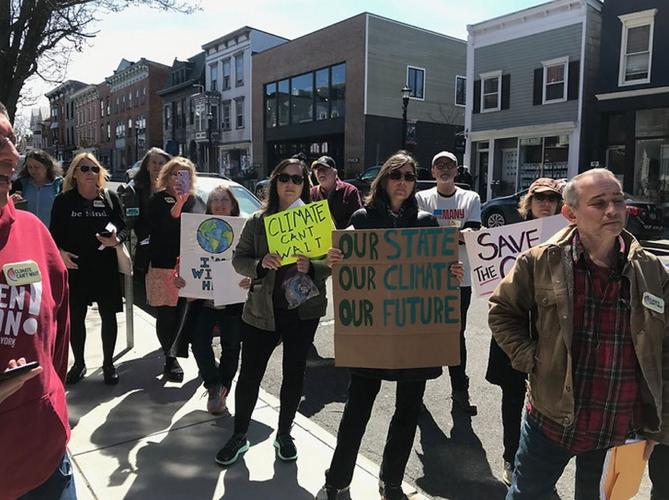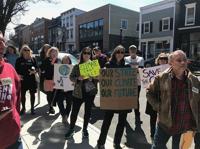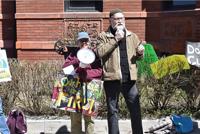HUDSON — Climate activists gathered outside Assemblywoman Didi Barrett’s, D-106, Hudson office Saturday to urge her to scrap a bill that would change the state’s accounting system for methane emissions.
Barrett’s introduction of the bill, which would align the state’s accounting system with international, federal and state-level governments, is roiling local climate action leaders who said they have been betrayed and blindsided by Barrett’s unexpected move.
The mood of the afternoon was somber as presenters delivered speeches to a crowd of about 60 protesters, said Anne Rabe, environmental policy director of the New York Public Interest Research Group. Speakers who pleaded with Barrett to change her mind accused the assemblywoman of not being transparent.
“The Assemblywoman turned her back on the Climate Leadership and Community Protection Act,” Rabe said.
Speakers also faulted Barrett for backtracking on a law supported by science and developed over a long period of time with the input of stakeholders.
“The state of New York has put so much time, research and energy into creating and passing the Climate Leadership and Community Protection Act,” said Becky Meier, cofounder of Community Advocates for Safe Energy and a Barrett constituent.
“It has been lauded across the country as landmark legislation,” Meier added. “We need to spend our time and resources figuring out how to enforce the act. We are dismayed to see that instead there is an effort to undermine a part of the legislation.”
“This bill neither guts nor in any way changes the Climate Leadership and Community Protection Act, which I voted for and continue to support,” Barrett said in a statement. Activists also said the passing of Barrett’s bill would provide renewable energy subsidies for “highly polluting” bioenergy, charging that Barrett is pandering to lobbyists.
“This bill neither guts nor in any way changes the goals of the Climate Leadership and Community Protection Act, which I voted for in 2019 and continue to support. It does, however, better help New York reach those goals without strapping steep costs on the back of everyday New Yorkers. This legislation aligns New York with the Intergovernmental Panel on Climate Change (IPCC)-based accounting method used by the Federal Government and virtually every other state in the country. The landscape has changed in the four years since the CLCPA passed – the administration in Washington, the economy, a global pandemic, and the availability of billions of dollars in federal funding through the Inflation Reduction Act.
“Aligning New York State’s accounting system with the Federal Government’s will allow us to tap into this vital funding, helping us reduce emissions and co-pollutants right away - rather than years from now. This legislation is about giving us the tools and resources to continue to build out the electric infrastructure needed for a just transition from fossil fuels, to reach our climate goals, and to ease the burden on already cash-strapped New Yorkers.”
“I believe we need to be using all the tools in our energy toolbox to reach our goals. We can start using biofuels today, drop in fuels that will significantly decrease our carbon emissions and the amount of emitted particulate matter. We know this particulate matter negatively impacts public health, especially in our disadvantaged communities which the CLCPA sets out to protect. Or we can wait for the solar and wind projects in the queue to come online and for energy infrastructure to be built, which is years out, and continue to use fossil fuels in the interim. To me, the former makes more sense.
“She’s doing the bidding of the fossil fuel industry,” said For the Many political coordinator Daniel Atonna.
Citizen Action of New York Policy Director Bob Cohen said the government should prioritize making a transition to fossil fuels more affordable rather than backtracking on established laws.
“Advocates have made several proposals to make energy more affordable this legislative session, including consumer rebates, subsidies for things like weatherization and electric vehicles and capping energy bills for low-income residents,” Cohen said.
River and Mountain GreenFaith Organizer Michael Richardson said the idea of aligning the state accounting system for methane emissions with that of the Intergovernmental Panel on Climate Change is meaningless.
“The Intergovernmental Panel on Climate Change does not have any standards in it,” Richardson said, adding he has research to document his conclusion.
In addition to rallying cries, protesters Saturday delivered to Barrett 77 memos of opposition from national, state and local organizations, Rabe said.
The Climate Leadership and Protection Act was signed into law July 18, 2019. The legislation set emissions reduction targets and created the Climate Action Council, a 22-member panel in charge of creating actionable proposals to meet the targets. The Council voted to advance its Climate Scoping Plan in December 2022.
This story has been updated with additional details from Assemblywoman Didi Barrett.













